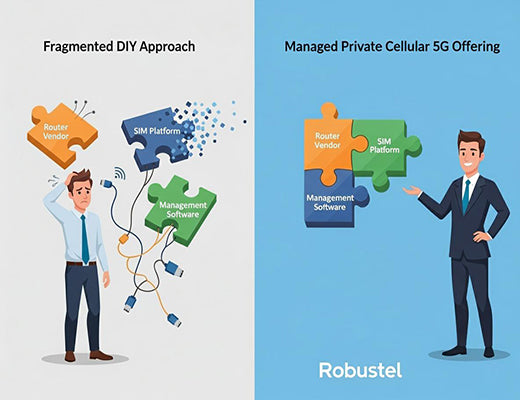
What is a Managed Private Cellular 5G Offering? A 2025 Guide for Enterprises
|
|
Time to read 5 min
|
|
Time to read 5 min
As enterprises seek more control, security, and performance from their wireless networks, the term managed private cellular 5G offering is becoming increasingly critical.
But what does it actually mean? A true managed offering is more than just hardware; it's a complete, vertically integrated ecosystem that combines industrial-grade 5G routers with a powerful cloud management platform.
This guide will break down the core components of a managed private 5G solution, why it's superior to a DIY approach, and how a platform combining the Robustel R5020 Lite router and the RCMS cloud service delivers the security, scalability, and control that modern enterprises demand.
I've spoken with many IT directors and CTOs who are excited by the potential of private 5G networks. They dream of the incredible speed, low latency, and enhanced security that a private cellular network can bring to their factory, warehouse, or large campus. But their excitement often turns to apprehension when they face the reality of implementation.
The "do-it-yourself" approach—sourcing routers from one vendor, a SIM management platform from another, and a device management tool from a third—creates a complex, fragmented system with multiple points of failure. Let's be clear: a truly robust private 5G network isn't just a collection of parts; it's a cohesive, managed service. This is why a vertically integrated managed private cellular 5G offering is a game-changer. It provides a single, unified solution for hardware, connectivity, and management, which is a core concept of any modern Industrial Cellular Router deployment.

A true managed private cellular 5G offering is an end-to-end solution built on three foundational pillars. It’s the seamless integration of these three layers that delivers the value.
The starting point for any high-performance private 5G network is the router. The Robustel R5020 Lite is purpose-built for these demanding enterprise and industrial environments.

This is what elevates a simple router into a managed private cellular 5G offering. The R5020 Lite is seamlessly integrated with the Robustel Cloud Manager Service (RCMS) .
A fragmented, multi-vendor solution creates multiple security gaps. A unified managed private cellular 5G offering provides a cohesive, end-to-end security architecture.

A managed private cellular 5G offering is the strategic answer to the complexity and security challenges of modern enterprise connectivity. It moves beyond the fragmented, do-it-yourself model and provides a single, cohesive, and secure ecosystem for your private 5G network. By combining a high-performance industrial router like the Robustel R5020 Lite with a powerful and cost-effective cloud management platform like RCMS, you get a vertically integrated solution that delivers the reliability, scalability, and lower Total Cost of Ownership (TCO) that your business demands.
A1: A public 5G network is the service you get from major carriers like AT&T or Verizon. A private 5G network is a dedicated, localized cellular network built exclusively for a single enterprise, providing greater control over security, performance, and data traffic.
A2: Yes. The R5020 Lite is designed to support a wide range of global 5G bands, making it suitable for deployment in various private 5G network architectures, including those using the Citizens Broadband Radio Service (CBRS) spectrum in the United States.
A3: While the initial hardware cost might be comparable, the Total Cost of Ownership (TCO) of a managed offering is almost always lower. When you factor in the massive savings from eliminating third-party management software licenses, reducing on-site technician visits through ZTP, and simplifying security management, the integrated approach provides a far better long-term value.